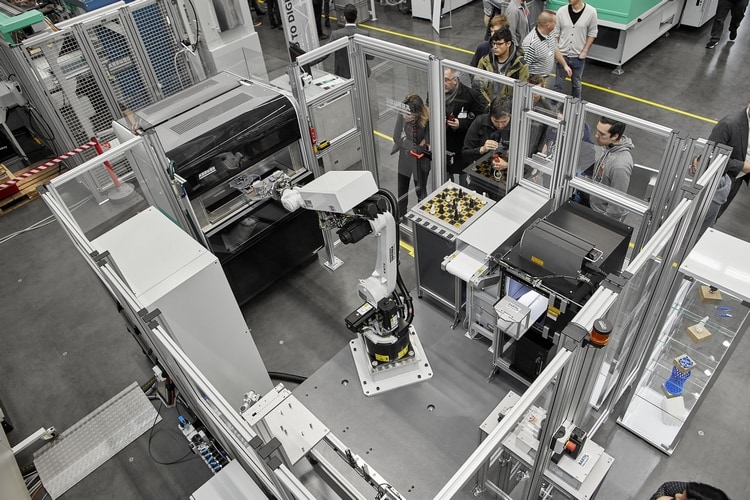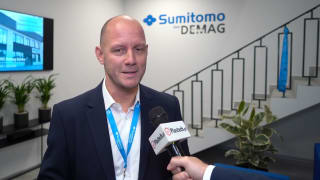Injection moulding highlights
Innovative applications in the automotive and lightweight construction sectors included injection moulding of rotor disks for servo-electric drive trains, as realised in the ProLemo research project, fibre direct compounding (FDC) of long fibre-reinforced lightweight components and physical foaming with Profoam. In addition, some customer applications from the automotive industry were on display. The largest component - a car front grille made of ABS - was produced on a hybrid Allrounder 1120 H with 6,500 kN of clamping force and Gestica control system.
In contrast, delicate micro dosing valves for medical technology weighed a mere 0.038 grams each. At the heart of the production cell was an electric Allrounder 270 A, equipped with a size 5 micro-injection unit, an LSR cartridge and a clean-air module. Another innovative application for medical technology was the production of labs-on-a-chip using assembly injection moulding. Using a Weber 2+2-cavity mould, an electric two-component Allrounder 520 A first produced two plates with connections for the fluidic supply plus two plates with fluidic channels. The mould then rotated electrically by 90 degrees, placing the two different plates directly on top of each other and joining them firmly together during the next injection process. In this way, a complete sealed lab-on-a-chip was produced in a total cycle time of around 35 seconds, including connections for the supply of fluidic solutions.
Cross-connectors made of PVC-U, which are used as connectors for dialysis tubes, were manufactured on a stainless steel electric Allrounder 370 A installed in the Arburg class ISO 7 clean room. The clean room machine meets the high hygiene requirements of ISO 13485 as well as FDA specifications and GMP guidelines.
Popular turnkey solutions
The "turnkey solutions" area with nine machine exhibits proved very popular. Two of these exhibits were equipped with the new ATCM (Arburg Turnkey Control Module) Scada system. As an example, the production of spirit levels on an electric Allrounder 470 A showed how the ATCM collects and combines the process and test data and visualises the key functions of the complete production cell.
There was considerable interest in customer systems which Arburg implemented as primary contractor and which highlighted trends such as the manufacture of hybrid components and turnkey systems with optimised installation area. As one example, a hybrid Allrounder 470 H overmoulded metal contacts with PBT (GF30) to form connectors for sensors in motor vehicles. This was followed by 100% continuity, high-voltage and optical testing before the good parts were deposited ready for shipping. Arburg implemented a particularly small footprint around an electric Allrounder 520 A. The entire turnkey system including the Multilift Select robotic system and the conveyor belt integrated into the protective housing is just 500 millimetres wider than the machine itself. An electric Allrounder 470 A demonstrated how optimum efficiency can be achieved by optimally matching injection moulding machine, mould and automation. The machine produced two 30-ml disposable cups made of medical PP in a cycle time of around 2.9 seconds. The mould was from Hofstetter, the automation from Hekuma.
Additive manufacturing: Freeformer and AM Factory
During the Technology Days, seven Freeformer 200-3X produced functional components from qualified standard granulates and special original materials, including materials with FDA approval for medical technology. One highlight was the new Freeformer 300-3X with three discharge units. It is the first machine capable of additively manufacturing resilient hard/soft combinations with support structure from three components. The exhibit produced movable gripper fingers made of ABS, TPE and support material - in a single step and without requiring additional assembly effort.
The added value that the Freeformer 300-3X offers in fully automated and IT-networked production cells could be seen at the world premiere of the AM Factory. As an example, the complex turnkey system individualised vacuum grippers for chess pieces in six versions – "on demand", fully automated and 100 percent traceable. After marking it with a DM code and plasma treatment, the Freeformer 300-3X completed an aluminium gripper plate with a functional TPU geometry adapted to the desired chess piece according to the 3D print job. The next process step was a tactile functional test of the gripper. Handling of the gripper plates, loading of the build chamber and functional testing were performed by a six-axis robot. Using the DM code, the data could be accessed at any time on a product-specific website.





